#like the book says 'sexless unless they make an effort'
Explore tagged Tumblr posts
Text
For real! Like why is the focus on questioning why asexual interpretations aren't including sex and not on whether the interpretations where they're having sex are reflecting the sex-favorable asexual experience?
Why are we not talking more about what allos can do to make their headcanons more representative of what it would look like for asexual characters to be having sex?
I'm giving it a little bit of a pass, cause so far it's been mostly ace people I've seen mentioned this. But then again;
A lot of the argument when it comes to whether Aziraphale and Crowley are not sexual is "ace people can still have sex!!". Like, an overwhelming amount
Which I dunno, but there's something about it that reminds me a lot of "but THIS sexual identity can still do this thing in society's standards!!"
#asexuality#good omens#like the book says 'sexless unless they make an effort'#so we should all be starting from a baseline of asexuality#but apparently that's too much to ask
11 notes
·
View notes
Text
Defining Ineffable Love (or, Aziracrow Learn the Rules of Romance)
(In response to this ask about ineffables and asexuality)
One of the major threads this season was Aziraphale and Crowley asking themselves what exactly is their relationship. Not what it is in terms of how much they love each other. (That's a given.) But what it is in terms of the human implications of their love.
Crowley and Aziraphale definitely come at the relationship with different perspectives, in terms of what they’re willing to admit to the relationship being. I don’t think we can entirely interpret it in human terms. –David Tennant (source)
For 6000 years, they’ve never put a name on their relationship. They didn’t, because they’re inhuman, genderless, sexless beings and they didn’t grow up (as it were) with labels. And even when they did learn them, they couldn’t say it was love, because admitting that was a death sentence.
All of Aziraphale’s heart eyes and pining could live comfortably in his mind if he never admitted what that said about him as an angel (trauma compartmentalization). Crowley tries desperately to be cruel and nasty to add white noise around the blatant reality of his constant loyalty to Aziraphale. If you don’t put a word to it, it’s not real and they can’t punish you.
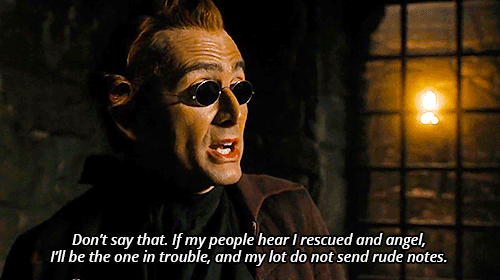
After the Not-pocalypse, for all rights and purposes, Aziraphale and Crowley chose humanity as their identity. We see Aziraphale “playing house” in various human roles (as a landlord, a private eye, a magician).
We even see Crowley intentionally taking on human behavior to handle emotional issues: “Just breathe, that’s what humans do.” They’re slowly and intentionally enculturating themselves into the world they want to belong––earth.
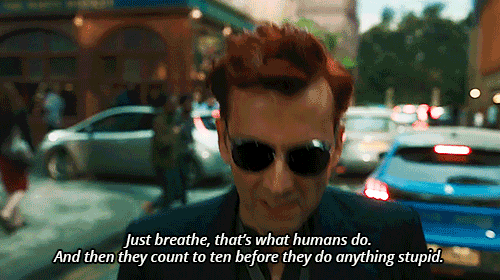
Yet it’s setting up Maggie and Nina that makes Aziraphale and Crowley start thinking about their relationship as a human construct.
Because fundamentally, Aziraphale and Crowley are not human. Like Neil Gaiman tells us constantly, they can’t be defined in human terms when it comes to gender and sexuality. They can shift and move through each and any of those markers at will, purely for the pleasure of the thing: “angels are sexless unless they really want to make an effort.”
IMO that makes them originally asexual, in the sense they were created without the need for sex. And it makes them fundamentally transgender and genderfluid, because while on earth, their sexless, eldritch spiritual bodies take on human, gendered forms and clothing. What gender (and sexuality) they identify with while on earth varies through the eras. Crowley definitely has a fluid gender identity, while Aziraphale appears to have settled on gay man (aka THE southern pansy) for his internal typology (although all of these identities are subject to change).
In the midst of all this fluidity, it’s no wonder Aziraphale and Crowley haven’t thought of their relationship in human terms before. There’s just so much different in them and their bodies than what they see in humanity. And there are no books and songs that show the kind of love they have, in the malleable, sexless bodies they have, with the background they have; it’s all ineffable.
Aziraphale and Crowley didn’t start out thinking they were in a romantic relationship. Whatever feelings they had were long repressed, redefined, and shuttled away. But they did love each other, without question. And it was that love which scared them, because it was bigger than anything they saw among humans, a love that was beautiful and blasphemous and unfathomable.
Kinda like what David Duchovny said about Mulder and Scully in The X-Files, “I don’t know if they’re in love. In a way, their relationship is deeper than that, because they cannot live without each other.”
Now take this profound, ineffable love and drop it into the little boxes and labels human culture has created for itself.
Full disclosure: I’m an asexual demiromantic person in a queerplatonic relationship, so I’ve done a fair bit of research on what romance is and how the rituals of romance are, in many ways, social inventions that vary from culture to culture. There’s love and then there’s romance, and they don’t always overlap. So my interpretation of Aziraphale and Crowley comes through this lens and the fact that Neil Gaiman has affirmed the validity of an ace-spec reading on our ineffables.
Which brings me back to my thesis: That only now are Aziraphale and Crowley thinking of themselves as a romantic couple, precisely because they are interfacing with humans and taking on their social rules.
I like this one asexual person’s description of their experience, which feels very much like our ineffables (from a very good article, I def recommend):
If there is a border between friendship and romance, then in my internal landscape, it goes right through a misty forest where no one has ever bothered to place signs.... Neither of us had intended to start anything even vaguely romantic, but the activities we did and the intense kind of immediate connection we had was coded as romantic in our culture.
That’s what Crowley realizes when Nina confronts him about his relationship to Aziraphale.
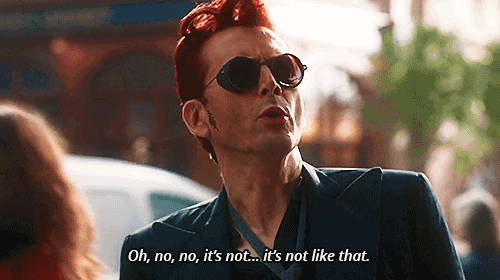
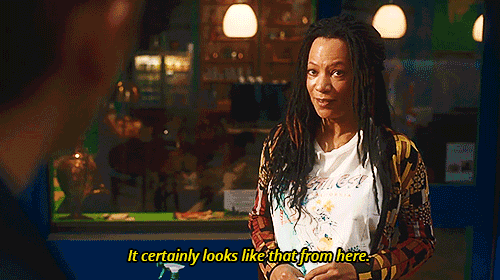
“It looks like that from here.” What Crowley and Aziraphale share is beyond definition, but Nina cannot imagine the anything beyond the human labels she was taught. The tragedy of an everlasting love is that it can only be conveyed properly to other humans if it is cast in such small human words––partner, boyfriend, husband.
Because when Crowley denied those human roles for Aziraphale, Nina slid down the path of thinking Aziraphale was just his “bit on the side,” because there were no labels left she could imagine for them. If you don’t put a word to it, it’s not real.
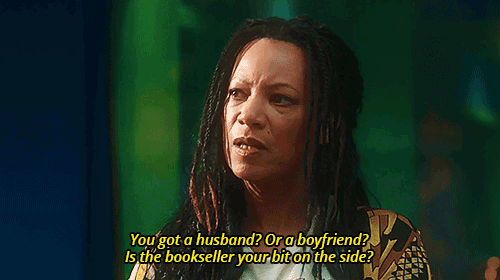
That’s the purpose of labels, to culturally validate a person's identity. Labels, of course, DO NOT create reality; people's experiences are always real, in all their varied ineffability. But labels allow a space for culture (ie other humans and political and legal society) to recognize formally your lived reality.
So Crowley started really thinking about him and Aziraphale, about the ineffable love between them and realized that in human terms, those would be the things he’d call Aziraphale, because those were the words that gave Aziraphale that place of importance in his life.
But with that realization comes all the human trappings and behavioral patterns around those words (the candlelit dinners, dramatic rescues, drinks at the Ritz, etc.) which Crowley had never thought of before, and yet… maybe romance is what he and Aziraphale have been doing all along.
That’s why this season centered so much around Aziraphale and Crowley using cultural artifacts (film and literature) to understand romance, because romance is so deeply socially-defined.
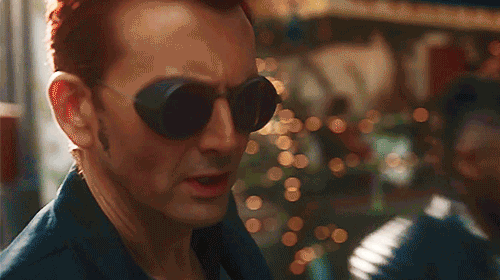
Aziraphale himself has been leaning hard into the romantic social cues (he’s more well-read in the cultural trappings of romance than Crowley is), especially post-Blitz. But when he watches Maggie and Nina dancing, he works up the courage to do something with Crowley that’s even more explicitly loaded as “traditionally romantic” than anything he’s done up to that point.
Because while risking their lives for each other and defying everything for each other is love in its purest form, dancing (specifically in Jane Austen’s world) is a public performance coded for potential marriage partners. It's an intimate ritual of the entire body. (And in British slang, dancing has been used as a euphemism for sex.)
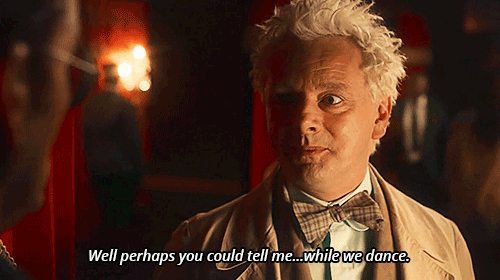
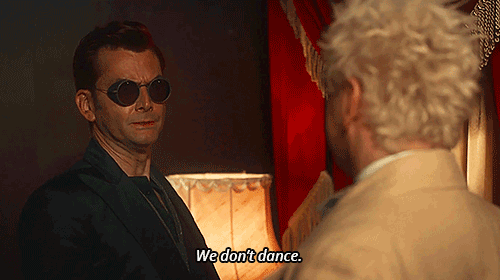
Crowley's "We don't dance" is really telling, because it shows Crowley’s awareness of the unknowable devotion between them vs the human roles Aziraphale is asking him to fill, specifically its physical aspects. Aziraphale is asking to make their relationship more public, more physically explicit, more coded as romantic in a setting specifically intended to couple individuals.
While Maggie and Nina inspired Aziraphale to progress their relationship into a publicly physical direction, Maggie and Nina inspired Crowley to think of the emotional implications of their human roles: the commitment, security, and monogamy of a husband, a partner, an us.
That’s what he decides after Maggie and Nina confront him in the end. “You never say what you’re really thinking.” He wants to codify his relationship so they each become responsible to one another. Aziraphale has always been his soulmate, the one he could always rely on. But he wants to place a word and a role to their love that will bring with it Aziraphale’s commitment and dedication to him.
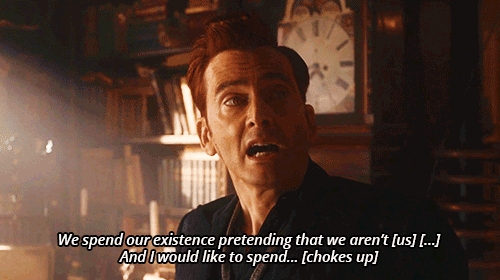
And that's another reason why Crowley kisses Aziraphale, because he knows Aziraphale was willing to make their relationship physical, and he wants that, too. To consummate this bond in the way humans do.
But Crowley doesn’t really know how to kiss; he’s not as worldly as he makes out to be. (It’s Aziraphale who owns the gun, and Crowley who’s never fired one.) He uses the kiss as a tool to get across to Aziraphale what he wants for them, in the physical language Aziraphale has been using, because "one fabulous kiss and we're good," right?
But it doesn’t work, because real life and real emotions don’t work like that; life and love don’t follow a script, despite the novels and plays and songs.
Aziraphale and Crowley spent this entire season trying to figure out what their relationship is and what they wanted out of it, trying to make sense of the unfathomable thing they share and the human implications of it, and not quite landing on the same page.
Part 2 of this Analysis, covering a correction in Crowley’s statement (“You don’t dance”) and the further implications of dancing/sex.
#please see the part 2 listed at the end for an analysis Crowley’s “you don’t dance#good omens#good omens 2#ineffable husbands#go s2 meta#go meta#good omens meta#queer#asexuality#asexual#aromantic#genderfluid#gos2spoilers#go s2#good omens 2 meta#ineffable romance#*mine#*mymeta
2K notes
·
View notes
Note
How do you feel about the fact that angels and demons are non-sexual beings in Good omens?
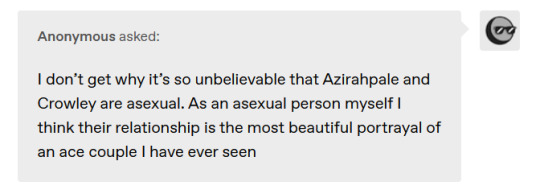

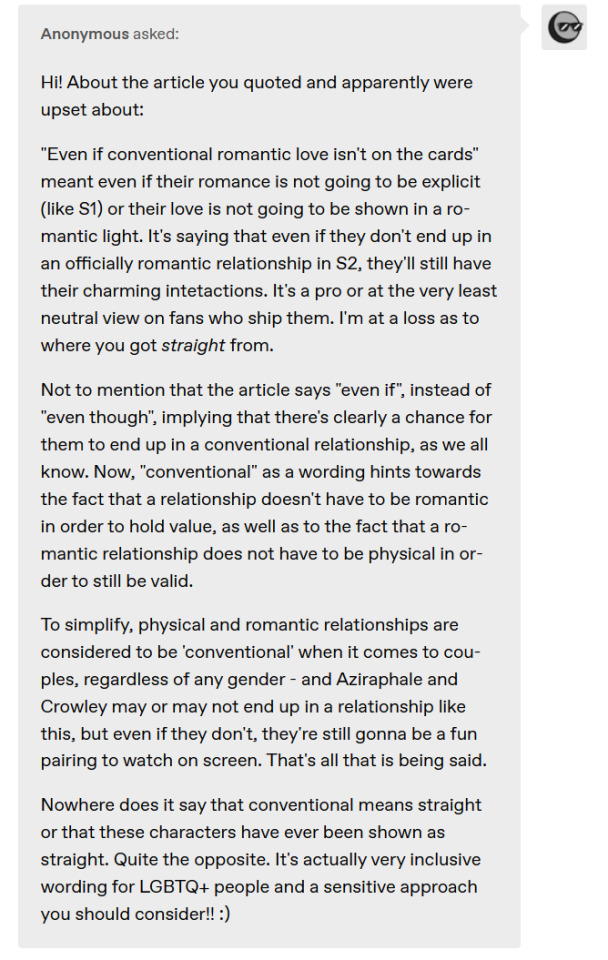
Anon #1: Well, this is a great question and I appreciate you sending it in for me to answer. Including the other Anons here since they are relevant.
I actually have a lot of feelings about angels and demons being non-sexual beings in Good Omens, which I will do my best to explain. I think the first thing I have to do is make sure I understand what you mean by non-sexual. I know Neil has said that angels and demons do not have genitalia "unless they make an effort," so by that measure, we can say angels and demons are genderless beings (agender or genderqueer perhaps as well, depending on the angel or demon). That, to me, is distinctive and not the same thing as non-sexual, which I consider to be beings who--by design or choice--do not engage in sexual intercourse.
The other thing we have to consider is the distinction between book!Good Omens and TV show!Good Omens. I have not finished reading the book, but it is my understanding that Neil (and Terry, of course) established the angels and demons as genderless in the original text. When the show was adapted for television, 30 years had passed since the novel was published, and so much had changed in that time, so a lot of things were updated to have Good Omens more align with the sensibilities of the modern era (one example is Neil talking about Crowley's aesthetic as an early '90s "Wall Street" type and how they had to figure out what the equivalent of that would be in the present day).
One thing that hasn't changed very much, however, is the portrayal of gay/queer people in the media. For much of those intervening 30 years, gay and queer people were shown as stereotypes--flamboyant, one-dimensional caricatures who existed as "sidekicks" (the "gay BFF") or object lessons for the straight characters (I would say this was especially the case in the late '80s and '90s with the AIDS crisis).
By this time, gay and queer people could exist on TV, but only if they were non-sexual/sexless. One example of this is Blanche's brother Clayton on The Golden Girls. After he comes out to Blanche, he brings home his fiance Doug in a subsequent episode, which has Blanche indignant. "I don't really mind Clayton being homosexual, I just don't like him dating men." Another example is Will & Grace, which aired in the late '90s. Will was a gay man who was one of the main characters, but while we constantly saw Grace falling into bed with random men and all sorts of escapades related to her sex life, we were never shown Will in any sort of similar situation. He could be gay, and he could be Grace's BFF, but he couldn't have a sex life of his own. It was this idea that gay people could exist in abstract terms, but not in the concrete reality of what it meant to be gay. Homophobia disguised as "acceptance."
So when I see/hear the word "non-sexual" in relation to gay and queer people, this is what comes to mind. What I also think of is that the absence of gay male sexuality (as for the majority of the show, Aziraphale and Crowley are male-presenting) is not the same thing as the presence of asexuality. I think it's been remarkably easy for Neil to take credit for that when it doesn't seem to have been his actual intention, and it also removes from him the responsibility of portraying that specific aspect of a non-heterosexual love story.
One thing I want to be very clear on is that I am in no way trying to put down anyone's head canon or what any reader or viewer may see in these characters, and I will never say that anyone's head canons are not valid. But when we are talking about the canon--in other words, what is actually on the screen--I feel like there is a tendency to overlook what Michael and David are actually doing with these characters.
In addition to what I mentioned above about gay characters on TV in the '80s and '90s, the other thing you absolutely could not do as a gay or queer person was fall in love. This is alluded to more in the example above from The Golden Girls, where Blanche is horrified that her brother wants to marry a man, until Sophia finally helps her understand:
Blanche: "Oh, look, I can accept the fact that he's gay, but why does he have to slip a ring on this guy's finger so the whole world will know?" Sophia: "Why did you marry George?" Blanche: "We loved each other. We wanted to make a lifetime commitment. Wanted everybody to know." Sophia: "That's what Doug and Clayton want, too. Everyone wants someone to grow old with. And shouldn't everyone have that chance?"
Here we are now, over 30 years later, and some people still don't want everyone to have that chance. Some people think two people of the same sex can't love each other the way a man and a woman do. Because queer love--and especially love between two men--is still looked at as "less than" and inferior to straight love.
This is the world Michael and David grew up in. This is the social and cultural climate they saw and navigated their own sexuality and identity in--'80s Britain, Margaret Thatcher, Section 28. Where being gay or queer wasn't just immoral, it was illegal. Your very existence alone was stigmatized, pathologized, and criminalized. And they are bringing that lived experience into the roles of Aziraphale and Crowley, albeit in different ways.
To me, Michael is playing Aziraphale as a repressed gay man. A man who--much like David--grew up in the faith and was made to believe that his natural feelings, attractions, and desires were wrong, shameful, and disgusting. We see this with Gabriel deriding Aziraphale for eating sushi and enjoying other Earthly pleasures, and it would be logical to think that it's taken a long time for Aziraphale to feel comfortable with the foods/drink/books he likes and the pleasure they bring him. Similarly, it's taken Aziraphale a millennia to find the one being who makes him feel comfortable with the desires he has. The being who is the exception to every rule Heaven ever laid out, who encourages Aziraphale to be himself in every respect. And that's Crowley.
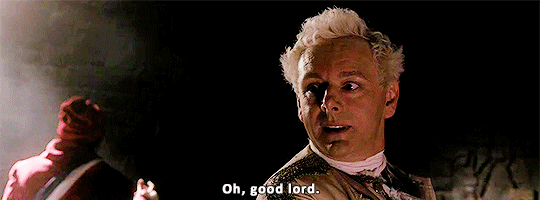

In this scene in the Bastille (which I know has been analyzed a thousand times and a thousand ways), when Aziraphale looks at Crowley like this, the desire rising up in him is more than obvious. The wide eyes, the heaving bosom, and of course the smoldering up-and-down glance all speak to this--he is, quite literally, checking Crowley out, without shame, possibly for the first time ever. Even though that desire is not outwardly expressed in GO season 1, it does not mean it doesn't exist--only that Aziraphale letting himself feel this (and Crowley being the one entity who allows him to feel this) is the first step in a very long journey away from that lifetime of repression.
In terms of Crowley, I feel that David is playing Crowley as a gay man who is afraid of commitment because he has been hurt in the past. There is a feeling of impermanence to Crowley--that, despite being a celestial, immortal entity, he doesn't like to hold onto things because deep down, he believes they will eventually be taken away. He knows who he is, but is all too aware of the consequences that come with it. So he does not get attached, because to him, attachment equals pain, and he believes nothing is worth that risk.
In the church scene in 1941 (which, again, so much has already been said), Crowley saves Aziraphale's books from the wreckage. It's been said by many that Crowley fell in love long before this (which I do think is true), but for me, I feel like this was where we saw that Crowley was truly "attached" to Aziraphale. He rescued Aziraphale from the Bastille, and he saved Aziraphale from the bombs of the Blitz, but in grabbing the books, Crowley isn't just saving Aziraphale's body--he's holding onto a piece of his soul. For the first time ever, Crowley has found something that isn't temporary, and after a millennia of cynicism, Aziraphale is the one entity who makes him feel fully and wholeheartedly ready to commit to something.
This is what I have seen and perceived in the portrayals of Aziraphale and Crowley that Michael and David have given us. I absolutely do 100% believe that asexual folks deserve representation--representation that is clear and specific, not just a side effect of Neil not wanting to show these characters expressing outward sexual desires--but I do not believe that is how Michael and David are playing the characters. It's not enough--or at least it shouldn't be--to have characters of marginalized backgrounds just standing in the room, or to say, "This one's gay," "This one's nonbinary," "This one's asexual." Including these identities in the fabric of the story means doing what Michael and David have done, which is showing these people or beings as three-dimensional, as fully realized characters who happen to have that identity, rather than as ticked boxes representing a certain identity on a checklist.
And to the Anons mentioning the Radio Times article (which seems like it came out a hundred years ago now)--Anon #4 particularly--I appreciate you sharing your thoughts with me, but I could not disagree with you more.
First of all, I have no idea where in the world you got that Aziraphale and Crowley's romance was explicit in season 1, because it was absolutely anything but. Three days after they posted that, RT posted another article seemingly backtracking on everything they'd previously said (as if we'd all somehow pulled a Gabriel Jim and forgotten everything about the first article). The phrase "Could romance be on the cards after all?" is in the bloody headline of article #2, which to me says that RT is going to go in whichever direction the wind blows--to create engagement and generate clicks--but also that it is very clear what they meant by "conventional" in the first article. I do not get the feeling that Radio Times--a mainstream publication that seemingly publishes any story they can farm from social media--was thinking of ace or aro identities or relationships when writing that. Even a tiny little bit.
Even a queer-centric media outlet like Pride today published an article saying the first season of GO lacked LGBTQ+ representation. Obviously, I do not at all agree with this or with several other things mentioned in the article. But what I am challenging folks to do is think about what this is really saying. By the end of GO 1 season, everyone accepts and assumes that Madame Tracy and Shadwell are a couple. She makes eyes at him, they have dinner together, and no one questions them being a couple, even though they are not shown being physically affectionate. Aziraphale and Crowley do exactly the same things, but no one (speaking of the larger public, outside the hardcore fan base) assumes they are a couple.
Maybe what that means, then, is that "representation" that requires you to squint and turn your head in order to see it--like Aziraphale and Crowley holding hands on the bus--isn't really representation at all. And by Neil "not wanting to label" something, it seems to suggest that committing to a label or embracing that gayness is something he is not comfortable with--for any number of reasons--and is why we could have a meaningless love scene with a straight couple that does not have a real connection (Newt and Anathema), but couldn't have a meaningful love scene with a gay couple that does have a devastatingly profound and powerful connection.
So yes, those are my thoughts on the angels and demons in Good Omens being non-sexual, and what that means in a larger cultural/societal sense. I know that when GO season 2 comes out in a week, I could be proven completely wrong about everything I've just said, and I will have no problem with that at all. I fully trust what Michael and David will bring to the roles of Aziraphale and Crowley, but my hesitation stems from the limitations they will potentially be up against, in terms of the script/storyline (and is something I have felt from the interviews we've seen with them this past week).
I'm hopeful for the best, though (as always), so we'll just have to see what happens...
#anonymous#reply post#good omens 2#good omens#aziraphale#crowley#ineffable husbands#michael sheen#welsh seduction machine#david tennant#soft scottish hipster gigolo#creators are not perfect#I think Neil may have some internalized homophobia he is still dealing with tbh#but people are afraid to call him out in any way#and this was me trying to keep my response short#probably going to have to turn off anons for a bit while i answer the rest#dealing with RL stuff at the moment so a bit backed up#discourse
167 notes
·
View notes
Text
aziraphale and crowley: sexless beings who can make an effort
there are a couple of things that i find really weird about all the discourse going around so i will use this post to summon my thoughts the best i can without writing an essay. this is not meant to be a completely new take on the topic, it's just mine, that has been occupying my mind far longer than i can take pride on.
so, the root of the matter is in this line from the book: "angels are sexless, unless they really want to make an effort". this is basically a rule containing its own exception. people who deny the possibility of any kind of sexual intimacy between them generally go for the rule, while people that think it possible go for the exception.
the first group of people would say "why would they?" and the second one, "why wouldn't they?" both valid. a rule is there for a reason, but so is an exception. if they would have wanted us to believe it impossible to think of sex between angelic beings, they wouldn't have included the exception. so, what we have so far is the possibility for both. therefore, it's as valid to think that they wouldn't have sex as it is that they would.
we had, however, other things. as it is them being able to do things in the human way despite it not being necessary for their nature, engaging in earthly pleasures such and eating and drinking, and other general activities such as reading. gardening, listening to music, driving, doing magic, etc. does this prove that they would want to have sex? of course not. it does prove, however, that they will do things outside of their nature just because they find them enjoyable.
so at this point, we know that is both biologically and voluntarily possible for them to desire sexual intimacy. they are not incapable of it in any way, which only leave us to say (from the denial side that they simply wouldn't want to. the main criticism to the take that they could and they would have sex comes from people who think of them as ace representation.
the thing is, asexuality is a spectrum. saying they would enjoy sex does not directly deny that they could be ace (in my mind, for example, crowley is demi) so when you say that people are "erasing ace representation" you are thinking about a very specific type of asexuality. one that is totally valid, but does not represent the feelings of the entire ace community towards sex.
it's not the best idea to project yourself into bits of the characters that have not been confirmed nor denied by canon and then be mad when other people think of them in a different way that you do. if you are ace and you don't engage in any kind of sexual activity, that's totally valid. as aziraphale and crowley have not been confirmed to feel that way towards sex, no one is erasing anything by saying that they would.
so to conclude this thing that ended up way longer than i originally intended, it's okay to see them as ace or not ace. it's okay to think that they wouldn't ever at all be interested in sex. what is not okay, is to accuse people of erasing representation (or even be mad at what is made canon) just because of the way you like to think of the characters.
the story is there. the possibility is there. you can't be mad that people hold on to the possibility.
i would like to add (because i feel it's a problem specially in this fandom) that anything that the author says that directly contradicts the story that has been told so far, it's not to be taken seriously. authors are people who need to money to live. and for people to give them their money, they need to please them. as the author of this story is in direct touch with fandom requests, it's not crazy to think that he would take a place on this discussion to please a group of people. we have a story, that’s what matters.
108 notes
·
View notes
Note
Hello! I'm sorry if this question sounds a bit weird, but I've just stumbled upon your post about aziraphale and crowley's first time and seen "#i don't care that they can manifest superdicks or superpussies or superboth"
I'm new to the fandom I was wondering if it has ever been discussed what their sex and gender would be as in mainstream Christianity angels are considered agendered and to have no sex. All of the posts I've seen about them use he/him pronouns and talk about dicks and yours is the first one I've seen to open the possibility to something else so that's why I got curious
On another note I agree with your original post, they would last 30 seconds and would leave the sex marathon or the tender sex for later.
Sorry again if it's weird a weird question I'm already regretting asking
Have a nice day!
hi!!! thank you for asking me this, i'm delighted that you're interested in this aspect of the good omens universe and that you came to me about it:-)
gonna put my answer under the cut as it's quite long!
this is what the book has to say about angels and their potential sexes:
... angels are sexless unless they really want to make an effort.
what most people have interpreted this to mean is that angels and demons are not inherently possessing of any particular primary sex characteristics (pasted from google: primary sex characteristics are those organs and other physiological structures that are directly related to sexual reproduction. These include both the primary (ovaries, testes) and secondary (vagina, penis) sex organs).
while they may have secondary sex characteristics (pasted from google: a secondary sex characteristic is any physical characteristic developed at puberty which distinguishes between the sexes but is not directly involved in reproduction) as part of their corporations - for example, tits or facial hair - most fans believe that angels and demons would have to actively 'make an effort' to manifest a penis or balls or a vulva or any combination or variation therein.
-
we've also got examples of what humans would view as gender variance within certain angels and demons the show - for example, there are angels with almost universally masculine names who are played by women (e.g. michael). these examples are largely seen to be a nod to the idea that gender identity is at least somewhat arbitrary for angels and demons.
here's a quote of a direction from the script book that sheds some light on this matter:
(There is a similarity to the angels, although they cross all races and do not necessarily have obvious genders. They all like wearing suits.)
-
here's another significant quote from the book, which is also paraphrased in the show:
For those of angel stock or demon breed, size, and shape, and composition, are simply options.
in fan content, this largely translates as follows: if crowley, aziraphale or indeed any other angel or demon wanted to 'make an effort', they could physically manifest whichever primary and secondary sex characteristics they chose. they are assigned a "corporation" - a body, or a 'vessel', as it's referred to in the tv show supernatural - that they must take care of, as we learn throughout the course of the story both in the book and the show, but the fanon view of this is that within that corporation, they can configure 'gender expression' and indeed have sex however they like.
-
why do angels and demons almost all have a perceived gender identity to viewers, even if they themselves do not subscribe to the idea of gender identity at all? why does gabriel read as a man, why does shax read as a woman, why is beelzebub referred to neutrally?
these questions are interesting and valid ones. gender expression always has a purpose in story, and good omens is no exception. i've actually got a detailed post that's been sat in my drafts for months about why i think that each significant character, and why the occasional side character, has the perceived gender expression they have. if people are interested, i shall go into this in another post.
-
all this to say - most people interpret crowley and aziraphale as at least vaguely male, in that they largely refer to both characters with he/him pronouns. for a lot of people, penis = male (even though this isn't inherently true), so most fans also like to think of them both as possessing penises by default, should they choose to possess any genitals at all.
popular headcanons posit crowley as genderfluid, due to their variety of gender presentations throughout the ages in the show (see the crucifixion scene and nanny ashtoreth), and aziraphale as agender, due to the way he's described in detail for the first time in the book, presumably among other things.
here's the first quote that i committed to this post in context, included here so you might understand better why people could see aziraphale as agender:
Many people, meeting Aziraphale for the first time, formed three impressions: that he was English, that he was intelligent, and that he was gayer than a tree full of monkeys on nitrous oxide. Two of these were wrong: Heaven is not in England, whatever certain poets may have thought, and angels are sexless unless they really want to make an effort.
especially in the time in which the book was written, gender identity and sexuality were and are inextricably tied to one another. to be gay was and largely still is to be a man who exclusively likes men, and therefore to refute the human assumption that aziraphale is gay is to also refute the idea that he is a man at all. of course, in the minds of terry and neil, this passage probably served to make a general point about angels with regards to gender and sex more than anything. however, some fans have drawn upon it to interpret aziraphale as being distinctly without a sense of gender identity. there'll be more to why people think of aziraphale as agender, but i don't know much about this aspect of fanon, so i'm not the best person to ask (someone reblog with more info pls?)
do feel free to interpret aziraphale and crowley's relationship to gender identity and sex characteristics in whichever manner you see fit :-)
-
the moral of the story: read, write, and look at fanart about crowley and aziraphale presenting with whatever characteristics you enjoy seeing them possess! i, for example, exist in a gorgeous little transmasculine corner of the internet where we love to write and read a male-presenting crowley with a vulva. this is not a requirement by any means for me to enjoy a fic where gender and sex presentation or sexual activity is relevant, it's just something i like in particular - and you get to decide what you like too, if you have any preference at all :-)
the great thing about crowley and aziraphale as characters is that, due to their ethereal (or occult, haha) nature, you can make them into whatever you want and put them wherever and whenever you want and it won't not make sense. go forth and be free with it!
i hope this clears some things up for you - if you have any more questions or thoughts, please do let me know<3
44 notes
·
View notes
Note
Hello there!!
Ask game 1, 6 & 17 :D
Hi there!! Thanks for the ask :)
1. Did you come to Good Omens via the book or the show?
Via the show initially, but I probably started the book before finishing S1.
True story: I was trying to find a free and nonlonely way to watch OFMD or Gentleman Jack, so I asked my college LGBTQ center if we could have a watch party. And THEN my amazing incredible friend (who works there) suggested Good Omens and I looked it up and I was like oh sure okay seems like a potentially good fantasy show. We ended up watching some OFMD and some GO, and I got super hooked on GO probably when the music on "Lift home?" in 1941 came in. Maybe earlier.
Shoutout to my other friend who recommended Pratchett to me years before and then cosplayed A&C with me :D
6. What is your favourite line from the show/book?
"...and I Did Not. Care. For It." from season 2 is one of my favorites (along with the bits before it). But there are so many! Here's some more
- all the usual ones
- special shoutout to "Get in, angel" (S1/book iirc) (S2 has so many more instances of "angel" and it's pretty neat)
- special shoutout to "and I would like to spend..." - S2
- "two consenting bicycle repairmen" - radio play
- "Not a southern pansy, Sargeant Shadwell! The southern pansy!" - S1, possibly book too (they're mixed up in my head)
- the footnote about firelighters in the book
- footnote about snowglobes in the book
- anytime anything nonbinary/gendery happens (man-shaped beings; they/them used at various points for God, Muriel, and Beelzebub; "I'm not. Either. But thank you," Mutt's spouse in S2, Crowley going ehhh when Dalrymple says "you're medical men")
- and of course, the whole paragraph "Many people, upon meeting Aziraphale [...] gayer than a tree full of monkeys on nitrous oxide [...] Heaven is not in England, no matter what certain poets might think [...] [discussion of angelic and human intelligence] [...] angels are sexless unless they really want to make an effort."
- oh gosh there are so many more
17. Would you rather be an angel or a demon?
Gosh I don't know. This brings me to another favorite quote:
Aziraphale was dithering. He'd been dithering for some twelve hours.
That's me right now. I'll just quote Stede Bonnet: "I'm a pretty solid mix of both!"
#good omens#good omens ask game#thanks for the ask!#crowley#aziraphale#nonbinary omens#ineffable fandom#ineffables
8 notes
·
View notes
Note
Honestly i read that out of context quote (haven’t read the book but enough of the paragraph has been flowing around) of “angels are sexless unless they make an effort” as in “lacking sexuality unless they make an effort” (as wasn’t it the explanation that Aziraphale being gay was not necessary true) and then effort in the way that… Angels don’t dance but Aziraphale made an effort to learn it. Or they aren’t hungry or need to eat or sleep or drink wine by default or need as humans do they lack all the things that made those things A Need, unless they put effort in it as eating and getting drunk and sleeping does bring unique pleasure too it.
So i read that quote as “yeah they have no sexuality unless they make an effort” which again is what the show and especially Aziraphale is all about. Angels by default and by nature don’t need sexual desire and have a “sexless” existence just as they don’t need food or sleep, but these specific angels have gone native and put an effort in doing useless human things as it does bring them joy.
Yeah, the full context is that it's explaining why Aziraphale isn't gay like he's perceived to be. Which as l've discussed before, is problematic despite how much the fandom loves it.
Because essentially what it means, is that two straight authors created a character who appears gay so that straight audiences can laugh at him... but refused to actually let him be gay to soften the blow for LGB people. The full quote is:

"Many people, meeting Aziraphale for the first time, formed three impressions: that he was English, that he was intelligent, and that he was gayer than a tree full of monkeys on nitrous oxide. […] angels are sexless unless they really want to make an effort.”
I forgot that "effort" wasn't even capitalised like the fandom does all of the time! Given GO’s tendency to capitalise things that are Important, I think that they’d have written it as Effort if it was as significant as the fandom claims it is. It being written as “effort” makes it seem like it really is just making an effort like one makes an effort to go somewhere, or do something, etc.
I checked my physical copy to see if it’s written like that there too, and it is.

So I agree with you on the interpretation of this line. It makes sense to me that "making an effort" is literally just making an effort. I can see it being about either sex or sexuality; making an effort to have a sex would just be having a sexed body, so the “making an effort" would just be getting a human body. And making an effort to have a sexuality would just be opening oneself up to the idea that an angel can enjoy sex and romance, like Aziraphale opened up to the idea that an angel can enjoy eating, or drinking, or dancing, etc.
That of course opens up the risk for it being interpreting angels as choosing their sexuality...but I think it would just be like rolling dice. A and C make the effort to try the whole intercourse thing out, and they find themselves only wanting to try it with men.
And for those that say "but they're celestials, they can't work the same way as humans do! They can't have a limiting sexuality!": 1. The whole point of the story is that angels and demons are more similar to humans than they like to think, and 2. Homosexuality is not "limiting" in the sense that we're missing out on or preventing ourselves from enjoying something. There’s no reason that every single non-human character should be bisexual, and there’s no reason that gay people should never be allowed to see ourselves in non-human characters because you think they’re above us.
7 notes
·
View notes
Note
I have never seen Good Omens, but I did read the book, which says "angels are sexless unless they specifically make an effort". Which might mean they don't have and/or want sex unless they deliberately choose to, which makes many characters including Aziraphale ace, which makes Good Omens queer rep. Or it might mean they don't have and/or want primary and/or secondary sexual characteristics unless they deliberately choose to, which sure sounds to me like it makes many characters including Aziraphale intersex, which makes Good Omens queer rep. Or it might mean they don't have and/or want gender unless they deliberately choose to, which makes many characters including Aziraphale nonbinary, which makes Good Omens queer rep. Could even be more than one of these at once.
Really the only way I can find to interpret this line that doesn't end in "which makes Good Omens queer rep" requires assuming that Aziraphale has deliberately chosen to be a straight cis allo perisex male angel. This is the character about whom we have the line "Many people, meeting Aziraphale for the first time, formed three impressions: that he was English, that he was intelligent, and that he was gayer than a treeful of monkeys on nitrous oxide."
(Either that or it requires assuming that the authors of Monstrous Regiment and the Wanda storyline in The Sandman are willing to joke about queerness but not to depict queer people.)
I'm cool with queer rep that isn't specific about which flavor of queer.
--
39 notes
·
View notes
Text
a thing I don't see people often talking about is how all angels and demons in good omens are nonbinary. it's mentioned a lot in passing but I don't often see how specifically that matters in story/worldbuilding and in turn as rep just because it's taken for granted, so I just wanna put my two cents on it here
first of all: this . both in the book n by neil gaiman himself, it's been confirmed that they're all sexless unless they make an effort. of course this is just fiction or whatever but the implication of it is basically that gender and its presentation especially are human made concepts. we are born as one or the other, or in the rarer cases, neither or something in between. (note: even lgbt ppl often forget abt intersex ppl, really.) that's a given. while angels and demons basically just... have their corporations. they can control their parts all they want in the way that humans can't. however, we can make parallel comparisons with it and how humans present their gender, in which it is ultimately based on choices.
what I'm saying is that gender as a concept is a social construct, and having that as either implied or stated explicitly in such a way that good omens has, is a really good thing actually ! it puts into perspective how lodged into society that is, but also shows us that society can function just fine, if not better, without paying too much attention to it. there's more important things to pay attention to when it comes to other people. it's not our business to tell them what they can or can't be. people simply are, and that's beautiful, but I fear that the limitations others pushed onto us (and how that's processed in each of our own realities) affects what we are
so like. yeah. nonbinary people. angels. demons. whatever. kewl. thanks for listening
#kiln talks#non horror / slasher#good omens#i forgot where I was going w this. but im just. hejejehjek. nonbiney rep........ so much. delicious food. yumyum#if u guys didn't know. I'm bigender. big fan of nonbinary content me#i just saw a tweet of someone talking abt how much rep was in go n they kinda just skimmed over the nonbinary thing ??#while they like. emphasized the lesbians#don't get me wrong i do love nina and maggie but we've had them sexless demons and angels since 1990.... scratches head
12 notes
·
View notes
Note
In Good Omens - do angels and demons even have sex organs to fuck with????
This is the best thing I have ever been sent, thank you so much, I am kissing you right on the mouth 😂
Okay, so basically, no - unless they want to have them. The book only says "angels are sexless unless they specifically make an effort", so the fandom has interpreted that to mean that Crowley and Aziraphale can manifest the body parts necessary to fuck with whenever they feel like it, and they don't always choose the same anatomy. Or sometimes they don't manifest any at all! Or they fuck in their ethereal forms, not their human ones. Or sometimes Crowley has a cloaca ('cause snake), etc. The wonderful thing about GO as a fandom is that when you have two immortal beings who are man-shaped but not actually men, you have a LOT have leeway to do whatever you want with them.
Here's another book quote that also illustrates this: "For those of angel stock or demon breed, size, and shape, and composition, are simply options."
15 notes
·
View notes
Text
Good Omens Book Quote #1
This is one of my favorite quotes from @neil-gaiman 's and #TerryParchett 's book Good Omens. It is about my favorite angel, Aziraphale and it goes as follows:
"Many people, meeting Aziraphale for the first time, formed three impressions: that he was English, that he was intelligent, and that he was gayer than a tree full of monkeys on nitrous oxide. Two of these were wrong; Heaven is not in England, whatever certain poets may have thought, and angels are sexless unless they really want to make an effort. But he was intelligent. And it was an angelic intelligence which, while not being particularly higher than human intelligence, is much broader and has the advantage of having thousands of years of practice.
Aziraphale was the first angel ever to own a computer. It was a cheap, slow, plasticky one, which touted as ideal for the small businessman. Aziraphale used it religiously for doing his accounts, which were so scrupulously accurate that the tax authorities had inspected him five times in deep belief that he was getting away with murder somewhere.
But these other calculations were a kind no computer could ever do. Sometimes he would scribble something on a sheet of paper by his side. It was covered in symbols which only eight other people in the world would have been able to comprehend; two of them had won noble prizes, and the other one of the other six dribbled a lot and wasn't allowed anything sharp because of what he might do with it."
--Neil Gaiman/Terry Pratchett "Good Omens" Pg. 194
This quoted passage says more about Aziraphale and his intelligence in a uniquely subtextual way. It suggests Aziraphale is brilliant in accounting and statistics, one of the hardest mathematical subjects to learn, understand, and comprehend, while also stating one of the very few, and/or only modern thing(s) in his bookshop is a computer most likely dating back to the late 1980s or early 1990s.
It's also particularly humorous that any tax authority agents could think that Aziraphale, a literal Angel (though they don't know it), could possibly be "getting away with a murder somewhere" due to his too-perfect tax records and brilliant accounting skills.
This book is an amazing, well-written masterpiece and an insanely good read. I laughed heartily several times while reading the book. All the characters are marvelous, funny, surreal, and easy to connect with. The story is fantastical, zany, fun, comedic, and surreal. It's a beautiful reminder that everything we hold dear could be gone instantly if an apocalyptic event wasn't adverted, though thankfully it was adverted with the help of love and friendship.
#NeilGaiman#terry pratchett#good omens#ReadMoreBooks#books#quotes#book quotes#aziraphale#AziraphaleBookQuote#Angel#love#read a book#ReadGoodOmens
5 notes
·
View notes
Text
Rewatching Season Two for the second time, picking up the things I missed (or didn’t miss but thought would be explained later and weren’t).
The book says that angels are sexless unless they make an effort, but that apparently doesn’t mean they don’t have genitalia, or presumably Nina would have had significantly more questions.
So, Gabriel was actually going to Beelzebub, not Aziraphale, but got confused once he put his memory in the fly, okay. So everything he says in the first episode that we thought (and he thought) applied to Aziraphale actually applies to Beelzebub, got it.
And his plan was, put his memories in the fly so the other archangels can’t erase it if they catch him, then find Beelzebub can put it back, got it.
How is he able to access some of the memories later? Why does it hurt when he tries? On first watch, I thought that he’d been put in an actual human body and couldn’t remember things because the brain wasn’t built right (he even says at one point that “his head isn’t built that way any ore or something, right?) but that doesn’t seem to be the case.
Or is he just like… remotely plugging into the fly’s head and so he means that the fly’s head isn’t built for it?
“That’s just something we used to say to frighten the cherubs”
In some hierarchies of angels cherubim are toward the bottom. However, in most they’re a good way up, above the thrones and dominions. (And principalities). Which suggests that Crowley might have been a Seraph.
(Unless you subscribe to the belief that he was a capital A archangel, which I don’t particularly) because I think that he and Aziraphale would interact with each other differently in the early times and he’d be higher in the hell hierarchy if he had been)
8 notes
·
View notes
Text
A few months ago, I finally finished to read...


So let's talk about it!
Starting with my critique and constructive criticism first and moving on to the things I liked, ending with an overall rating going from 0-5 starts, 5 being the best and 0 the worst.
Disclaimer: This is a review of the BOOK "Good Omens". I will mention the show, but not consider it when making my points. I will also assume that you've at least watched the show or have a basic understanding of the characters as well as the story. Because explaining all of it would make this post too long to read. Obviously this means they're spoilers ahead!
Let's get one thing out of the way before I move on:
For anyone expecting me to tell you about how progressive and representative this book is, when it comes to queerness, I must dissapointed you. I'm really sorry to do so, especially considering that the only reason I picked up this book and decided to read it in the first place WAS because of Crowley's and Aziraphale's relationship. Thinking that it was gay af.
If you're ready "Good Omens" with the mindset that it must be gay, then it surely seems like it. Especially because of many moments at the beginning seeming to be extremely queer coded with hints of Crowley and Aziraphale being more than just friends.
If you don't have that mindset however, then there's no obvious gayness to be found. And all of the previous mentioned scenes suddenly seem like interactions between close friends and nothing more.
With Neil Gaiman even confirming that it's just that and not a romantic relationship between two men.
In fact, canonically speaking, neither Crowley nor Aziraphale are actually man. The book explicitly states that both angels as well as demons are sexless and therefore can't be gay.
(Took a picture of this while reading it, because it stuck in my mind. But I sadly can't remember the page on which that was stated. If anyone knows it, feel free to add it in the comments. Also: sorry for the bad quality.)

Another part that really stuck in my mind was this one:

The fact that both Crowley and Aziraphale are sexless, yet present to be man, have masculine names and use the pronounce "he/him", combined with the fact that, I quote, "angels are sexless unless they really want to make an effort" lead me to the conclusion that both of them are, in fact, men. Not because it's their sex, but because they choose to be in this form.
A thing that confused me a lot when reading this book, is that the authors seem to want to make it look gay, without actually commiting to it.
I really don't want to say this, but I want to be honest to you: this is nothing more than pure "queerbaiting". Even though it may not be by definition, nor can I know for sure if that was the intentions of the authors. But it still felt very much like it. (More on that in this post)
After watching the show I really hoped the book would go into more detail when it comes to the "romantic" relationship between our two main charaters, but I was more than dissapointed to find out that was not the case.
An easy way to fix it would be to either fully commit to the fact that Crowley and Aziraphale are gay, or not hint at it/make it look like it might be the case, at all.
Another thing that really bugged me was that the story had, in my opinion, way too many characters it tried to shove in. None of which really get their time to shine because of it. With almost 90% of their backstory, motivation, etc. being told in pure infodump. Or, alternatively, we don't get much of a backstory or motivation at all.
I don't mind a huge cast and I have nothing against point of views changing or characters not being fully fleshed out. Especially if they're just side or even background characters. Leaving parts of their characters unexplored can, when used right, lead to your own mind starting to wander, coming up with different theories in the process. But again, this is ruined by the pure infodumping that leaves almost nothing to the imagination.
Instead of literally 1 ½ pages of characters, all of which you have to remember to at least some degree, I'd suggest to have a smaller cast, but spending more time on them and their backstory.


I know that part of it is used for comedic purpose, the characters descriptions being enough to prove that, but the large cast still made it unnecessary complicated.
I also didn't liked that the main focus of characters seemed to shift extremely from chapter to chapter. In some parts of the story, the focus was solely on Crowley or Aziraphale for many chapters after each other. Only for the entire mood and atmosphere to shift, changing the pov to one of the many side characters I couldn't care less about.
I particularly found it annoying to read from the pov of Shadwell, who felt like he added absolutely nothing useful to the overall story. It felt like a chore to get through his chapters, of which there are quite many of. I more often than not considered to skip them entirely, but then I wouldn't have enough context for what happens next.
Again, an easy fix for it would be a smaller cast and to focus more on the two characters most, if not all, came to read here about: Aziraphale and Crowley.
Now to what I liked about "Good Omens"
I really enjoyed the basic idea behind the story. It is extremely creative and well done, in my opinion.
The humor didn't always work for me, but when it did, it surely gave me a good laugh. And I really liked the ridiculousness of some of the scenes. I think "Good Omens" is the only book where a drunk angel and demon talk about dolphins during the end of the world and it doesn't seem odd or out of nowhere.
I loved the relationship between Aziraphale and Crowley, even though it isn't romantic. And after the first few chapters we only see it rarely. I would love to read an entire book completely from their povs.
The footnotes really added to the world and the worlbuilding without destroyed the flow of the story too much. Especially because you can skip part of it or come back to it later without any problem.
Speaking of the world building: In general, I think it's pretty well done. We learn a lot about the lore of this world, how everything happening in the past influences what happens in the future. And I would really like to see more "in depth" stories about it.
Having an oddly specific "abrahamic religion mythology obsession-phase" during that time, fueled by the songs from Ghost gaining popularity, I also loved that many of the religious aspects were "canonically correct". Even mentioning the different angelic (and I think also demonic) ranks. If you're into demonology or angelology, I think this book is def a good read.
I also like that the show is more or less accurate to it's source material (as far as I can remember). Meaning if you liked the show or, if you liked the book, I'd recommend checking out the book, or show, respectively.
So I guess this is my first book review based of the poll I made once.
All in all, I'd give this book 3/5 stars.
When it was in my opinion bad, it was extremely bad. But likewise, when it was good, it was extremely good.
For more reviews, discussions, original stories/series and more, check out my master list of series.
4 notes
·
View notes
Text
#will a sex scene happen? eh idk#if it does do i need it to be hysterical and imply that london and wider uk infrastructure goes into meltdown? absolutely
#also it would be really funny if there's some elaborate intricate intimate ritual that is heavily implied to be a metaphor for sex#and then in their post-metaphorical-coital state they fuck
#also i want effort jokes#they both concentrate real hard and then peek under the blanket at each other#'oh i thought you would -' 'well okay i can -' 'i mean. we could try it. like this' 'doesnt that seem a bit advanced?'
#im already imagining god’s voiceover w that line ‘‘angels and demons are sexless unless they make an effort. and oh boy were aziraphale and#crowley Making An Effort’’ cut to a shot of clothes randomly hitting the floor
#like Azi's wings deploy and Crowley gets flung across the room
#crowley gets literally FLUNG a from the second floor window of the shop half naked and extremely disorientated#three quarters naked aziraphale peers down from the huge hole in the wall while all of the street gathers around like ‘tf is this’
#CROWLEY COMING OUT SMOKING COVERED WITH FEATHERS ETC AND AZIRAPHALE IS LITERALLY EXACTLY THE SAME...#dabbing his mouth with a fancy hankerchief and looking like mildly pleased. meanwhile crowley is losing his shit
#it could be so inexplicit that it’s unclear if they really fucked in any formerly known meaning of the word
#they momentarily break the laws of physics#it rains from the ground up#a 60k lazarii miracle shows up in the globe in heaven and alarms go off everywhere#scales start popping out of crowley's skin and both of their wings pop out#there's feathers everywhere#crowley's smoking. literally. scorching#all the bookshelves are toppled over and there's books all over the place
#they are going to fuck up time and space so much that it makes february have like 31 days and the moon have its own satelite
#everything is PURPLE#new nebulae are suddenly created#earthquake in london#the m25 gets rearranged
#a new star formation appears. gabriel and beelzebub watch it in awe. beelzebub says ‘wow they got their shit together’
#that would be the best thing#and so iconic in character#just two beings being incompetent at things yet still succeeding somehow
#I'm very dedicated to them being sexless/asexual but this would be hilarious
#literally if it’s not the funniest and most chaotic thing ever written its not even worth it#commit to the comedy of good omens#it’s for the greater good
#if there aren't feathers inexplicably flying everywhere then what are we even doing here
#biblically accurate gay sex
thing is - and hear me out - if s3 does by any minute chance incorporate any suggestion of a sex scene, it is imperative for me that they commit to the bit. i need crowley to nearly topple over trying to get out of his jeans, i need aziraphale to complain that they cant do anything downstairs because that would be scandalous, and i need them to trip over going up the stairs because they keep getting distracted. i need one of them to accidentally get an elbow to the face, i need them to have a long forgotten book digging into one of their backs, and aziraphale is horrified when crowley launches it across the room, and i need there to be hard cut to whickber street having a huge power surge, lines sparking, all the power going out, and every car alarm in a 2-mile radius start screaming, i don't need it to be explicit or overly romantic but i do need it to be fucking funny
18K notes
·
View notes
Note
Good morning dear @neil-gaiman
This could be a confusing question, because obviously to find out more we will have to wait for the release of the second season of Good Omens (I suppose, I don't know for sure which is why I decided to ask). I think I understood then that angels and demons are asexual beings, without gender, do I understand correctly? But does this also mean that they cannot have certain types of experience with their mortal bodies? I mean, for example Aziraphale and Crowley have tried food (and our angel loves it) and wine, which are earthly pleasures. I would like to know if other types of pleasures (which most of the time are related to love) are somehow forbidden or it is customary not to "satisfy" them.
What the book actually says is that 'angels are sexless unless they really want to make an effort'. The angels and demons in Good Omens aren’t remotely human, and as a small part of that they aren’t male nor are they female.
Not that they couldn’t be male, female or intersex, or do things with their bodies and body-shapes if they really wanted to make that effort. As it also says in Good Omens the book, For those of angel stock or demon breed, size, and shape, and composition, are simply options.
Does that help?
1K notes
·
View notes
Note
So i wondered, A and C are ace. Because from what I understand about it is angels and demons don’t really feel attraction right? At least not how Neil and Terry had thought about them. They have interests sure, they like things just not any sexual attraction to anyone. But if they were pure humans you think they might have been gay then? I mean they could still be ace too. I just wondered since the main reason they don’t feel attraction is because they can’t, they’re not programmed that way. Wondered what you would think?
Hiya! :) What A and C are is nowhere specifically stated. In the book there is a sentence 'angels are sexless unless they really want to make an effort', Neil said:
What it says in the book is
…angels are sexless unless they really want to make an effort.
Sexless isn’t synonymous with asexual, at least, not for Terry and me.
What Aziraphale and Crowley are is for you to define. I am ace and I like to think of them as ace. Someone else likes to imagine them having hot and steamy sex. Both - and everything in between, other and more - are fine. I believe they are not specifically defined just for each one of us to see their relationship as we like :) ❤.
154 notes
·
View notes